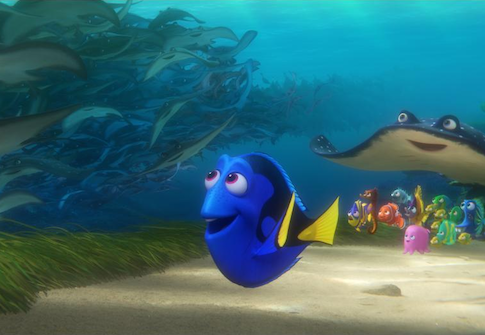Finding Dory is the sequel to 2003’s Finding Nemo. In that film, a clownfish named Marlin (voiced by Albert Brooks) teamed up with a blue tang named Dory (Ellen DeGeneres) to rescue his son, Nemo (Alexander Gould), who had been captured while on a school trip.
Dory provided much of the comic relief in Finding Nemo, as her short-term memory loss led to all sorts of hijinks. As we learn in Finding Dory, however, that memory problem masked a sad story: Dory’s affliction caused her to become separated from her mother and father, forcing her to wander the wide expanse of the ocean. As she grew older, she could remember only that she had lost something—she can’t even remember that it was her parents.
But then, while hanging out with Nemo and his classmates, Dory experiences a flash of a memory. She remembers her parents, recalling what they looked like and a snippet of advice they gave to her. The memories don’t come flooding back, exactly, but she knows what she has to do: travel across the ocean and find them. Adventures ensue, lessons are learned, growth is achieved, and problems are solved.
Finding Dory is mid-tier Pixar, meaning that it’s better than 90 percent of what you’ll find in theaters even if it’s not a four-star, instant masterpiece like Up or Wall*E or The Incredibles or the Toy Story trilogy. I only welled up once—I don’t want to spoil it, but there’s a shot toward the end that is about as pure a physical representation of parental love as you’ll ever see on film—so this isn’t quite the tearjerker that Pixar films sometimes have a tendency to be.
It’s funny and clever and cute. Albert Brooks and Ellen DeGeneres aren’t really voice acting so much as voice actualizing. They are themselves, for better or worse; I think it’s for the better, especially in the case of Brooks. Indeed, I’ve long been of the opinion that Brooks makes everything he is in better. His voice has a naturally comic rhythm and tone that can’t help but bring a smile to your face.
I saw this film in Imax 3D and had no specific complaints about the format. The computer-animated children’s film is one of the few genres that have managed to incorporate the 3D effect in a way that is neither nauseating nor distracting. I’m not sure the upgrade in expense is necessary, mind you, but at least it isn’t deleterious, as is so often the case.
Pixar continues its tradition of including a short in front of the feature with the delightful "Piper," about a baby sand piper learning how to dig for clams. Like most of Pixar’s shorts, it’s dialogue-free; and, like most of Pixar’s shorts, it’s borderline brilliant and just about worth the price of admission on its own.
